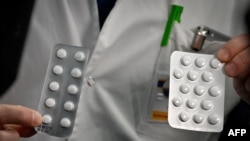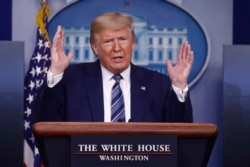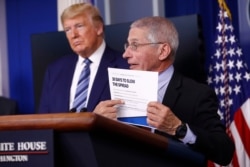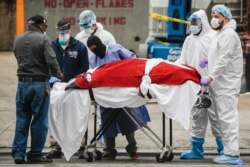The debate over the usefulness of an antimalarial drug to treat U.S. coronavirus victims is pitting President Donald Trump against the country’s top U.S. infectious disease expert, Dr. Anthony Fauci.
With the U.S. coronavirus death toll increasing by hundreds a day, Trump at daily news briefings regularly touts the use of hydroxychloroquine, calling it a potential “game-changer” to save lives.
"What do you have to lose? Take it," the president said in a White House briefing over the weekend. "I really think they should take it. But it's their choice. And it's their doctor's choice or the doctors in the hospital. But hydroxychloroquine — try it if you'd like."
Fauci, often standing a step or two away from the U.S. leader in the White House briefing room, says data showing possible hints of success from use of the drug in treating coronavirus patients is “at best suggestive” and not based on scientific studies. He is the longtime director of the country’s National Institute of Allergy and Infectious Diseases.
Trump on Sunday seemed weary of Fauci publicly stating yet again that scientific evidence of the drug’s success inm treating coronavirus patients is lacking. When a reporter asked Fauci about medical evidence supporting use of the drug, Trump cut him off from answering, telling the reporter,“ Do you know how many times he’s answered that question? Maybe 15.”
A contentious debate over the use of the drug erupted at a coronavirus task force meeting in the White House situation room on Saturday between Trump trade adviser Peter Navarro and Fauci, who consistently has voiced skepticism and caution about use of the drug.
“This drug could save lives,” Navarro told CNN on Monday. “We are at war here. We’re trying to make sure as few people die as possible.”
But Navarro also acknowledged, “There are downsides to this. There can be in some cases negative effects. It’s related to [the] heart and related to vision.”
He said that ultimately, use of the drug must depend on agreement between doctors and their patients after they have discussed possible side effects.
Navarro downplayed the weekend argument with Fauci, saying, “If we didn’t have disagreement and debate in the Trump administration, this administration wouldn’t be as strong as it is.”
Navarro, a social scientist with a doctoral degree but not a medical doctor, said initial studies from Wuhan, the Chinese city where the coronavirus first appeared, show use of the antimalarial drug is promising as a treatment. Fauci mostly dismisses the reports, saying they were not conducted under rigorous scientific testing protocols.
Navarro said the U.S. has a stockpile of 29 million tablets of the antimalarial drug, adding that “virtually every New York (coronavirus) patient is given hydroxy.” The country’s biggest city is at epicenter of the coronavirus outbreak in the U.S.
The debate over hydroxychloroquine comes as Trump, Fauci and Surgeon General Jerome Adams all are warning Americans they face daunting days ahead, as the U.S. death toll mounts rapidly to more than 10,000, and with 347,000 confirmed cases of the infection.
“This is going to be the hardest and saddest week of most Americans’ lives, quite frankly,” Adams told “Fox News Sunday.” “This is going to be our Pearl Harbor moment, our 9/11 moment, only it’s not going to be localized. It’s going to be happening all over the country."
Trump, speaking to reporters at a Sunday evening briefing, expressed some optimism, saying there is a “light at the end of the tunnel,” while noting the difficult circumstances that lay immediately ahead.
"The next week and a half, two weeks, are going to be, I think, they're going to be very difficult,” Trump said. “At the same time, we understand what they represent and what that time represents. And hopefully, we can get this over with, because this is a very horrible thing for the world."
Fauci said that stay-at-home orders that cover 41 of the country’s 50 states and social distancing guidelines take time to show their effects.
"What you're hearing about potential light at the end of the tunnel doesn't take away from the fact that tomorrow, the next day, are going to look really bad," Fauci said.
Trump has not issued national lockdown orders like those in Italy and Spain, preferring to leave that decision to state governors. Most have given their own order, but nine have not.
Fauci said the people in the nine states are “putting themselves at risk” by not self-isolating, even if their governors have not issued stay-at-home orders.
“This virus does not discriminate” whether one lives in a small community or a large city,” Fauci said.








